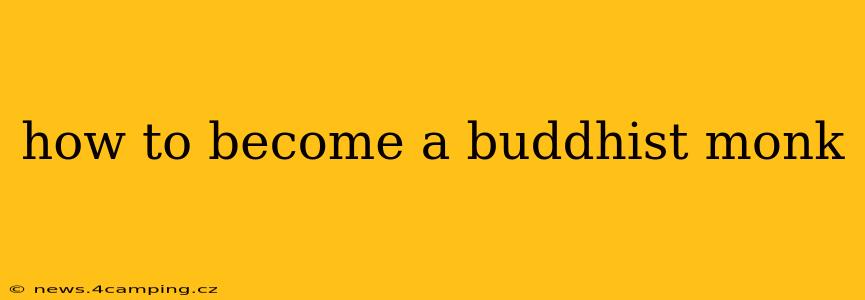The path to becoming a Buddhist monk is a deeply personal and transformative journey, varying significantly based on the specific Buddhist tradition and the individual's commitment. This guide explores the common steps, challenges, and considerations involved in this significant life change.
What Does it Mean to Be a Buddhist Monk?
Before embarking on this path, it's crucial to understand what monastic life entails. Buddhist monks (or bhikkhus) dedicate their lives to the practice of Buddhism, striving for enlightenment through rigorous discipline, meditation, and study. This commitment involves renouncing worldly possessions, family life, and many personal freedoms to focus solely on spiritual development. The level of commitment and the specific practices vary widely among different schools of Buddhism (Theravada, Mahayana, Vajrayana, etc.).
Choosing a Buddhist Tradition
The first step is identifying the Buddhist tradition that resonates most with you. Different traditions have unique monastic codes, practices, and expectations.
-
Theravada Buddhism: This tradition, prevalent in Southeast Asia, emphasizes personal practice and the attainment of enlightenment through individual effort. Monastic life is often characterized by a strict adherence to the Vinaya (monastic code).
-
Mahayana Buddhism: Practiced across East Asia, Mahayana Buddhism emphasizes the Bodhisattva ideal – working for the enlightenment of all beings. Monastic life in this tradition can be more varied, with some monks focusing on contemplative practice while others engage in social work and teaching.
-
Vajrayana Buddhism: Predominantly found in Tibet and surrounding regions, Vajrayana Buddhism utilizes advanced tantric practices to accelerate spiritual progress. Monastic life within this tradition often involves rigorous training in meditation, ritual, and esoteric teachings.
Finding a Suitable Monastery
Once you've chosen a tradition, finding a monastery that aligns with your values and aspirations is essential. Research different monasteries, considering their location, the style of practice, the language spoken, and the level of experience required from prospective monks. Visiting monasteries to experience the community and discuss your intentions is highly recommended.
What are the requirements to become a Buddhist monk?
The specific requirements vary greatly between traditions and monasteries. However, common prerequisites often include:
- A genuine commitment to Buddhist practice: Monastic life demands significant dedication and self-discipline. A strong understanding of Buddhist principles and a sincere desire to follow the path are essential.
- Physical and mental health: Monastic life can be demanding, both physically and mentally. Good health is necessary to cope with the rigors of the practice.
- A willingness to follow the monastic rules (Vinaya): Monks are expected to adhere to a strict code of conduct that governs their daily life, including their speech, actions, and possessions.
- Sponsorship or recommendation: Some monasteries may require sponsorship or a recommendation from an experienced monk or teacher.
- Basic understanding of Buddhist teachings: A foundational understanding of Buddhist philosophy and practice is often expected.
How long does it take to become a Buddhist monk?
There's no set timeframe. The process often begins with a period of probation, during which aspirants live in the monastery and learn about monastic life. After this probationary period, ordination ceremonies usually follow, marking the formal acceptance into the monkhood. The length of the probationary period varies widely depending on the tradition and monastery.
What are the daily activities of a Buddhist monk?
Daily routines generally include:
- Meditation: A significant part of monastic life is dedicated to meditation practice, often lasting several hours a day.
- Study: Monks spend time studying Buddhist scriptures, philosophy, and other relevant texts.
- Chanting: Chanting sutras and other sacred texts is a common practice.
- Manual labor: Many monasteries engage in manual work, such as gardening, cleaning, or maintenance, as a way to support the community and develop mindfulness.
- Alms-round: In some traditions, monks go out to collect food donations from the community.
Can I become a Buddhist monk if I am married?
Generally, Buddhist monks are expected to be celibate and renounce worldly attachments, including marriage. However, some traditions may have different approaches or offer alternative paths for those who are married or have family commitments. This is something to discuss directly with a monastery or teacher.
What are the challenges of being a Buddhist monk?
The monastic life presents numerous challenges, including:
- Loneliness and isolation: Renouncing family and social life can lead to feelings of loneliness.
- Physical discomfort: Living a simple life often involves physical hardship.
- Spiritual struggles: The path to enlightenment is not always easy, and monks may face various spiritual challenges.
- Strict discipline: Adhering to the monastic rules requires constant self-discipline.
Embarking on the path to becoming a Buddhist monk is a profound decision that requires careful consideration, preparation, and a genuine commitment to the practice. By understanding the different traditions, finding a suitable monastery, and addressing the challenges head-on, aspirants can begin their transformative journey towards spiritual growth and enlightenment. Remember to always conduct thorough research and engage in open communication with a monastery before making such a significant commitment.
